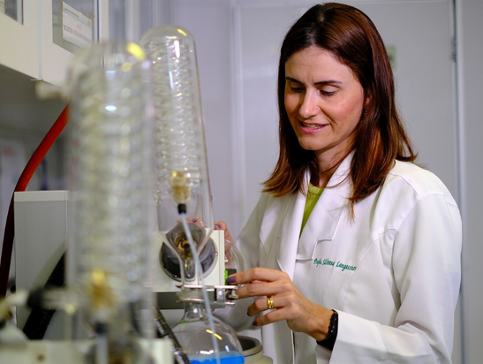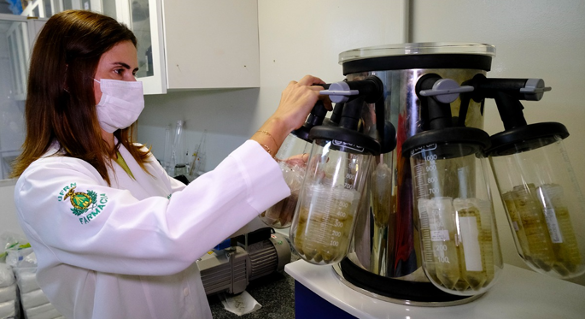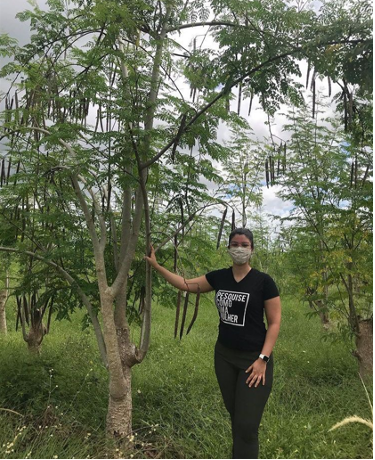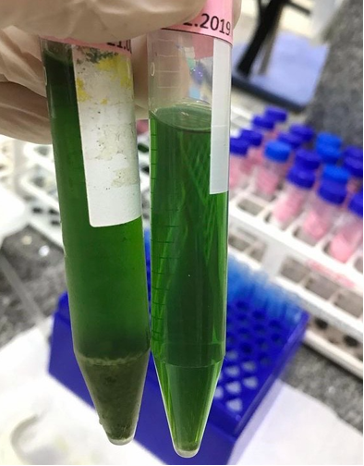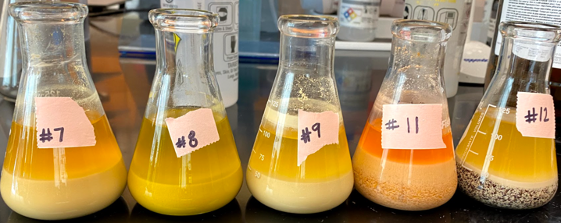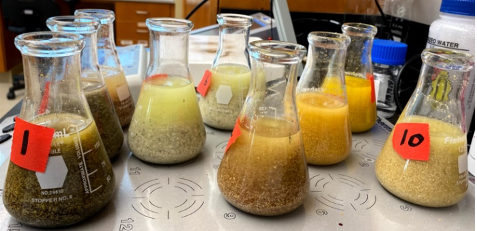Research
Our key scientific goal at the Esposito lab is the pursuit of an integrated understanding of the molecular, cellular and physiological mechanisms by which select plant-derived proteins and phytoactives may modulate tissue regeneration and repair. Our research has encompassed the disciplines of plant chemistry, inflammation, skin biology, muscle physiology, basic and applied molecular and cellular biology and nutrition. The research has spanned both the basic and clinical sciences.
Thus, our interdisciplinary approach allows for a comprehensive evaluation of plant-derived molecules by looking at multiple cellular mechanisms of action to understand the systemic architecture that controls muscle growth, muscle stem (satellite) cells differentiation, inflammation, skin cell migration and wound closure. The lab thrives on our enthusiasm of interdisciplinary work, devotion to research, and leadership at the NC State University Plants for Human Health Institute. We are constantly attracting new students and research scientists to our group, resulting in steady increase of output and visibility of complex biological systems research at NC State University.
Our current goal employs these skills and expertise to develop an interdisciplinary, broad-based tissue regeneration and repair research program that will apply basic science discoveries in the areas of phytochemistry, regenerative medicine, and skin care to improve human health and wellbeing. We are heavily focus on the application of plant-based bioactives to three interconnected research areas:
- Inflammation and tissue regeneration as it applies to wound healing and skin care;
- Cell-based biological screening in conventional, 3D matrices, and stem culture technologies; and
- Muscle aging and repair.
Lab Projects
Polyphenols-rich Plant Extracts as Raw Material for the Development of Phytotherapeutics to Treat Chronic Diseases
Investigator: Silvana Zucolotto, Visiting Scholar
Focused on understanding the mechanism of action of phenolic-rich extracts from native Brazilian medicinal plants in downregulation and/or upregulation of specific gene expression involved in the production of markers of diabetes, inflammation and wound healing properties in in vitro assays. According to previous results obtained in preclinical trials in Brazil (acute and chronic in vivo models), P. edulis, F. flavicarpa “maracuja,” Kalachoe brasiliensis “Coirama” and “Saiao”, Kalanchoe pinnata “Coirama” and “Saiao”, Commiphora lepthlofoes “Imburana”, Nopalea cochenillifera “Palma”, Cereus jamacara, Jatropha mollissima “Pinhao-bravo” and Jatropha gossypiifolia “Pinhao-roxo” were chosen. Some extracts are a by-product obtained from a tropical fruit which can be considered a value added product, as for example, P. edulis fruit peel. Our findings can contribute to the development of new phytopherapeutics or functional foods that can be used as an adjunct in treatment of chronic diseases due to healthy properties.
Study of the Mechanism of Anti-Diabetic, Healing and Anti-Obesity Action of Moringa oleifera (moringa) Leaf Extract through Gene Expression: An Extract Rich in Phenolic Compounds as a Raw Plant for the Development of Phytotherapeutics
Investigator: Larissa Pereira, Visiting Scholar
The objective is to study chemically and pharmacologically the species of Moringa oleifera (Moringaceae) which, although native to India, is adapted to Brazil and is one of the most consumed plants by the population of the Northeast region in Brazil. The leaves are high in nutritional content and have important minerals, vitamins and distinct antioxidant agents. Also, the present study plan is to investigate, through in vitro tests, the antihyperglycemic effect, the enzymatic and cellular mechanisms of the action involved. Thus, seeking active markers for M. oleifera leaf extracts. We expect that the results obtained in this study plan will bring new perspectives for diabetes adjuvant treatment and complementary information on the processes involved in the pharmacological action pathways. In addition to contributing to the strengthening of the entire national production chain of possible phytotherapeutic products with this species.
Development and Evaluation of Topical Formulations Based on Natural Products in the Repair of Skin Wounds
Investigator: Reggiani Goncalves, Visiting Scholar
This research focus is working with peptides extracted from frogs and vegetable extracts to increase the effectiveness of the wound healing process in cultured cells. The general research goal aims to assess and develop new topical formulations derived from natural products of animal and plant origin for the treatment of cutaneous lesions. The hope is to identify a therapy that provides a fast and effective cutaneous repair at an affordable price.
Extracting, Quantifying, and Investigating the effects of Brassinosteroids from Plants
Investigator: Nick Thompson, Graduate Student
This research looks at extracting and quantifying brassinosteroids from various plant sources. Additionally, the researcher is investigating the effects of brassionsteroid, or endogenous plant hormone supplementation on muscle development in poultry (Gallus gallus), with a focus on anti-inflammatory properties. So far, the research has been on cell culture involving chicken HD11 and mouse RAW 264.7 cell lines with plans for chicken embryo and live bird trials in the near future.
Development of phytochemical-rich watermelon particles
Investigator: Roberta Correia, Visiting Scholar
The primary objective of our project is to produce lycopene/citrulline-rich particles using watermelon as our primary source of phytochemicals. An efficient spray drying process will be developed and the particles will function as botanical additives to multiple food and cosmetic applications. In preliminary experiments, semi purified watermelon extracts with a high concentration of lycopene/citrulline extracts have been obtained. In this next phase, our goal is to obtain spray dried lycopene/citrulline-rich particles by complexing different drying carriers (protein and complex carbohydrates: gelatin, whey protein isolate and soy protein isolate; maltodextrin) with watermelon extracts. In fact, proteins have been extensively used for industry applications, and they act as efficient emulsifiers that enhance the bioavailability of phytochemicals, and stabilize the interface in oil-in-water (O/W) emulsions, besides increasing the drying efficiency. On the other hand, maltodextrin have been widely used in the industry for several purposes. This strategy aims to obtain watermelon/protein particles with preserved and concentrated lycopene and citrulline contents. In order to achieve our goal, the drying process will be evaluated and the best drying parameters will be determined. Besides this, the physicochemical attributes, phytochemical content and in vitro biological activities (inflammatory markers and wound healing activity) of watermelon/protein particles will be determined and compared.

Stimulation of wound healing and muscle growth function by Brassinosteroids
Jia Xiong
This project utilizes a systemic architecture that controls inflammation and tissue regeneration processes and investigate brassinosteroids with novel health benefits, especially in regards to fundamental and applied relevance to skin care and muscle health.
Dietary Polyunsaturated Fatty Acids and Immune Response to Respiratory Pathogens
Investigator: Kathleen Walter
This project uses neonatal swine as our model, which has translational applications to both the swine industry and human health. The main goals of this project are: (i) to evaluate immune cell fatty acid enrichment from dietary supplementation with different long-chain polyunsaturated fatty acids (PUFA); and (ii) to study the effects of PUFA enrichment in innate immune cells to respiratory pathogens ex vivo.
The Effect of Brassicaceae Bioactive Compounds on Biomarkers of Inflammatory Processes Associated with Aging
Investigator: Sierra Bonney
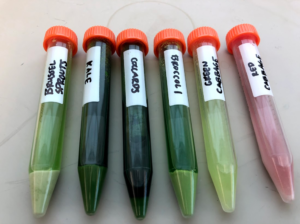
The focus of this project is to further study bioactive compounds found within Brassicaceae plants in order to identify health benefits both in cell models and an accelerated aging mouse model. Brassinosteroids found within these plants have been found to have a number of health promoting properties including increased lean muscle mass, physical fitness, anti-inflammatory properties, and acceleration of cutaneous wound healing. By using an accelerated aging model, applications of these phytochemicals on inflammatory diseases and age-related chronic inflammation can be evaluated.
This project utilizes a systemic architecture that controls inflammation and tissue regeneration processes and investigate brassinosteroids with novel health benefits, especially in regards to fundamental and applied relevance to skin care and muscle health.

